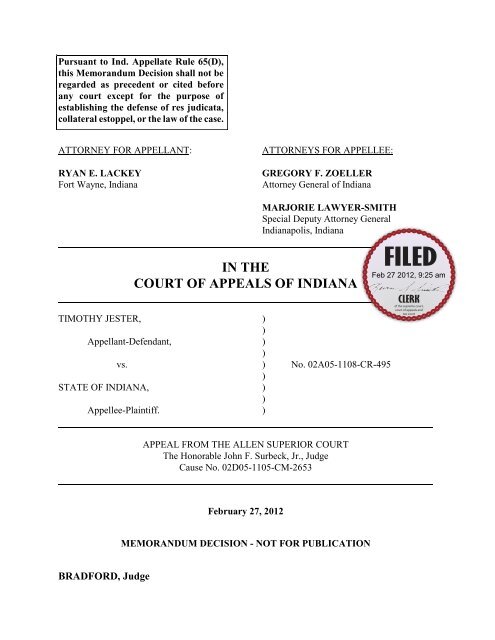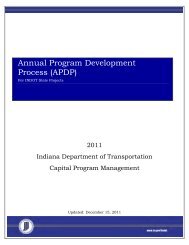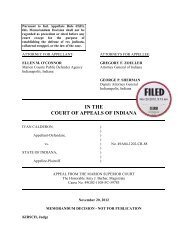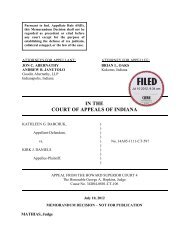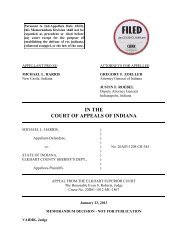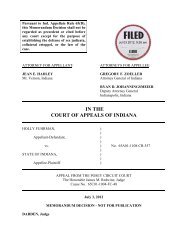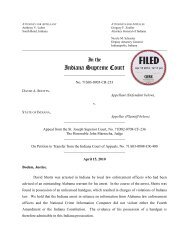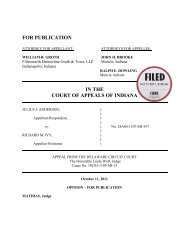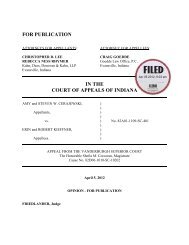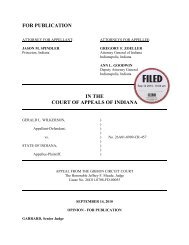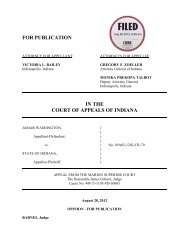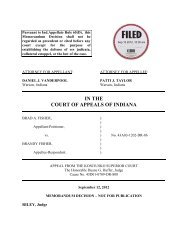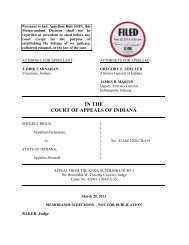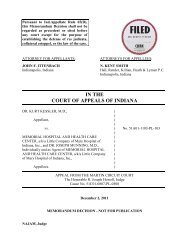Timothy Jester v. State of Indiana
Timothy Jester v. State of Indiana
Timothy Jester v. State of Indiana
Create successful ePaper yourself
Turn your PDF publications into a flip-book with our unique Google optimized e-Paper software.
Pursuant to Ind. Appellate Rule 65(D),<br />
this Memorandum Decision shall not be<br />
regarded as precedent or cited before<br />
any court except for the purpose <strong>of</strong><br />
establishing the defense <strong>of</strong> res judicata,<br />
collateral estoppel, or the law <strong>of</strong> the case.<br />
ATTORNEY FOR APPELLANT:<br />
RYAN E. LACKEY<br />
Fort Wayne, <strong>Indiana</strong><br />
ATTORNEYS FOR APPELLEE:<br />
GREGORY F. ZOELLER<br />
Attorney General <strong>of</strong> <strong>Indiana</strong><br />
MARJORIE LAWYER-SMITH<br />
Special Deputy Attorney General<br />
<strong>Indiana</strong>polis, <strong>Indiana</strong><br />
IN THE<br />
COURT OF APPEALS OF INDIANA<br />
TIMOTHY JESTER, )<br />
)<br />
Appellant-Defendant, )<br />
)<br />
vs. ) No. 02A05-1108-CR-495<br />
)<br />
STATE OF INDIANA, )<br />
)<br />
Appellee-Plaintiff. )<br />
APPEAL FROM THE ALLEN SUPERIOR COURT<br />
The Honorable John F. Surbeck, Jr., Judge<br />
Cause No. 02D05-1105-CM-2653<br />
February 27, 2012<br />
MEMORANDUM DECISION - NOT FOR PUBLICATION<br />
BRADFORD, Judge
Appellant-Defendant <strong>Timothy</strong> <strong>Jester</strong> appeals his conviction for Class B misdemeanor<br />
Public Intoxication. 1 Specifically, <strong>Jester</strong> contends that the evidence is insufficient to support<br />
his conviction. We affirm.<br />
FACTS AND PROCEDURAL HISTORY<br />
During the early morning hours <strong>of</strong> May 6, 2011, <strong>Jester</strong> was celebrating his birthday<br />
with friends at the River Tavern in Fort Wayne. At some point, <strong>Jester</strong> engaged in a fight with<br />
another male bar patron. Bartender Dawn Hagar requested help separating the men from<br />
bouncer Christopher Murphy. Murphy separated the men and escorted them outside. As they<br />
were exiting the bar, another patron, Stacie Leech, was shoved down and injured. The fight<br />
continued outside. At some point, <strong>Jester</strong> attempted to reenter the bar. As bar patron Teisha<br />
Gonzalez attempted to keep <strong>Jester</strong> from re-entering, <strong>Jester</strong> hit her in the face and pushed her<br />
aside. <strong>Jester</strong> went inside and retrieved his hat. He then left the bar.<br />
Fort Wayne Police Officer John Greenlee was met at River Tavern by a few other<br />
<strong>of</strong>ficers. Hagar and Murphy told the <strong>of</strong>ficers about <strong>Jester</strong>‟s participation in the bar fight and<br />
that <strong>Jester</strong> was walking a block or two down the street. After <strong>Jester</strong> was apprehended,<br />
Officer Greenlee observed that <strong>Jester</strong>‟s “face was flushed, his eyes were watery, bloodshot; I<br />
could smell alcohol on his person; and his speech was mildly slurred or just a little<br />
abnormal.” Tr. p. 139.<br />
On May 6, 2011, the <strong>State</strong> charged <strong>Jester</strong> with two counts <strong>of</strong> Class A misdemeanor<br />
battery resulting in bodily injury and one count <strong>of</strong> Class B misdemeanor public intoxication.<br />
1 Ind. Code § 7.1-5-1-3 (2010).<br />
2
The trial court conducted a jury trial on August 24, 2011, at the conclusion <strong>of</strong> which the jury<br />
found <strong>Jester</strong> not guilty <strong>of</strong> both counts <strong>of</strong> Class A misdemeanor battery resulting in a bodily<br />
injury and guilty <strong>of</strong> Class B misdemeanor public intoxication. The trial court sentenced<br />
<strong>Jester</strong> to 180 days with credit for time served. This appeal follows.<br />
DISCUSSION AND DECISION<br />
<strong>Jester</strong> contends that the evidence is insufficient to support his conviction for Class B<br />
misdemeanor public intoxication.<br />
When reviewing the sufficiency <strong>of</strong> the evidence to support a conviction,<br />
appellate courts must consider only the probative evidence and reasonable<br />
inferences supporting the verdict. It is the fact-finder‟s role, not that <strong>of</strong><br />
appellate courts, to assess witness credibility and weigh the evidence to<br />
determine whether it is sufficient to support a conviction.… The evidence is<br />
sufficient if an inference may reasonably be drawn from it to support the<br />
verdict.<br />
Drane v. <strong>State</strong>, 867 N.E.2d 144, 146-47 (Ind. 2007) (citations, emphasis, and quotations<br />
omitted). “[I]t is for the trier <strong>of</strong> fact to reject a defendant‟s version <strong>of</strong> what happened, to<br />
determine all inferences arising from the evidence, and to decide which witnesses to<br />
believe.” Holeton v. <strong>State</strong>, 853 N.E.2d 539, 541 (Ind. Ct. App. 2006). Upon review,<br />
appellate courts do not reweigh the evidence or assess the credibility <strong>of</strong> the witnesses.<br />
Stewart v. <strong>State</strong>, 768 N.E.2d 433, 435 (Ind. 2002).<br />
<strong>Indiana</strong> Code section 7.1-5-1-3 provides that “[i]t is a Class B misdemeanor for a<br />
person to be in a public place … in a state <strong>of</strong> intoxication caused by the person‟s use <strong>of</strong><br />
alcohol or a controlled substance.” Thus, in order to convict <strong>Jester</strong> <strong>of</strong> Class B misdemeanor<br />
public intoxication, the <strong>State</strong> was required to prove that <strong>Jester</strong> was in a public place while in<br />
3
a state <strong>of</strong> intoxication.<br />
“„Intoxicated‟ means being under the influence <strong>of</strong> alcohol „so that there is an impaired<br />
condition <strong>of</strong> thought and action and the loss <strong>of</strong> normal control <strong>of</strong> a person‟s faculties.‟”<br />
Fields v. <strong>State</strong>, 888 N.E.2d 304, 307 (Ind. Ct. App. 2008) (quoting Ind. Code § 9–13–2–86).<br />
“With respect to the sufficiency <strong>of</strong> the evidence upon the element <strong>of</strong> intoxication, it is<br />
established that a non-expert witness may <strong>of</strong>fer an opinion upon intoxication, and a<br />
conviction may be sustained upon the sole testimony <strong>of</strong> the arresting <strong>of</strong>ficer.” Wright v.<br />
<strong>State</strong>, 772 N.E.2d 449, 460 (Ind. Ct. App. 2002). Among other factors, intoxication may be<br />
established through evidence <strong>of</strong> the consumption <strong>of</strong> significant amounts <strong>of</strong> alcohol, impaired<br />
attention and reflexes, watery or bloodshot eyes, the odor <strong>of</strong> alcohol on the breath, unsteady<br />
balance, failure <strong>of</strong> field sobriety tests and slurred speech. Fields, 888 N.E.2d at 307 (citing<br />
Ballinger v. <strong>State</strong>, 717 N.E.2d 939, 943 (Ind. Ct. App. 1999)).<br />
In the instant matter, the charging information alleged that <strong>Jester</strong> was “found in a state<br />
<strong>of</strong> intoxication” in a public place, specifically, the “area <strong>of</strong> the 1200 block <strong>of</strong> West Main St.”<br />
Appellant‟s App. p. 10. <strong>Jester</strong> concedes that he was in a public place, but argues that the<br />
evidence was insufficient to prove that he was intoxicated. Upon review, however, we<br />
conclude that despite <strong>Jester</strong>‟s contention to the contrary, the evidence was indeed sufficient<br />
to prove that he was intoxicated at the time he was arrested.<br />
With respect to <strong>Jester</strong>‟s state <strong>of</strong> intoxication, Murphy, who was working as a bouncer<br />
at the River Tavern on the night <strong>Jester</strong> was arrested, testified that he saw <strong>Jester</strong> “have a<br />
couple beverages” that included vodka, gin, and whisky. Tr. p. 95. Murphy testified that<br />
4
<strong>Jester</strong> engaged in a bar fight during which he was “randomly throwing punches” and acted in<br />
an aggressive manner when instructed by Murphy to leave the bar. Tr. p. 97. Murphy further<br />
testified that <strong>Jester</strong> displayed certain signs <strong>of</strong> intoxication, including “glassy eyes and slurred<br />
speech and a strong smell <strong>of</strong> alcohol on his breath.” Tr. p. 98. In addition, Officer Greenlee<br />
testified that he noticed that <strong>Jester</strong> displayed certain signs <strong>of</strong> intoxication, including the fact<br />
that <strong>Jester</strong>‟s “face was flushed, his eyes were watery, bloodshot; I could smell alcohol on his<br />
person; and his speech was mildly slurred or just a little abnormal.” Tr. p. 139. In addition,<br />
<strong>Jester</strong> admitted at trial that on the night in question, he had “between three (3) and five (5)<br />
drinks.” Tr. p. 154. Further, when questioned about his alcohol consumption, <strong>Jester</strong> stated “I<br />
was celebrating my birthday … I had a couple. I mean, … I‟m not gonna say that I was<br />
clear-minded.” Tr. p. 153.<br />
In light <strong>of</strong> <strong>Jester</strong>‟s admission that he had drank between three and five drinks and that<br />
he could not say that he was “clear-minded,” when coupled with the testimony <strong>of</strong> Murphy<br />
and Officer Greenlee, we conclude that the evidence is sufficient to support <strong>Jester</strong>‟s<br />
conviction for Class B misdemeanor public intoxication. <strong>Jester</strong>‟s argument on appeal<br />
effectively amounts to an invitation for this court to reweigh the evidence, which we will not<br />
do.<br />
The judgment <strong>of</strong> the trial court is affirmed.<br />
KIRSCH, J., and BARNES, J., concur.<br />
5


